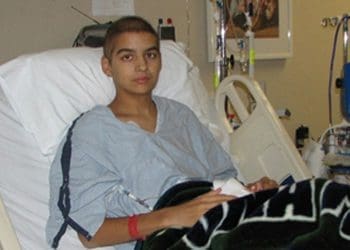A closer look at Dr. David Munn’s Phase I clinical trial

There is an urgent need for better treatments for kids with brain cancer. Recurrent brain tumors are the leading cause of cancer-related deaths in children, yet current treatment options, such as radiation therapy, surgery, and aggressive chemotherapy, have limited effectiveness and can cause significant long-term side effects.
Immunotherapy, which uses the body’s immune system to fight cancer, has not had a significant impact on pediatric brain tumors so far, despite showing promising results for some other cancers. Immunotherapy treatments like checkpoint inhibitors, which target specific molecules involved in immune suppression, have not been successful for brain cancer patients except in rare cases. And, other types of immunotherapy, such as CAR-T cells and vaccines, are still in the early stages of testing.
A clinical trial, led by Dr. David Munn and Theodore Johnson of the Medical College of Georgia at Augusta University, will examine if a unique combination of therapies can offer new treatment options to children who are actively progressing and have become resistant to chemoimmunotherapy.
Building on Indoximod
A promising new drug, called Indoximod, has shown positive results in previous and ongoing clinical trials. Even children who had a partial response to indoximod had better overall survival compared to other standards of care.
Despite these positive outcomes, some patients still show resistance to indoximod and experience disease progression. To address this issue and help more patients reach better survival odds with Indoximod, researchers have identified a new mechanism, proposing that a combination treatment may be the solution.
Drs. Munn and Johnson identified that a well-known pathway in the body, called Bruton’s Tyrosine Kinase (BTK) signaling pathway, is an upstream driver of IDO expression. They hypothesize that BTK is responsible for the resistance to the indoximod drug. They have found that blocking this pathway by using another drug, called ibrutinib (already approved for other indications), could potentially overcome the resistance and improve the effectiveness of the treatment.
This study will test if a combination of the two drugs, indoximod and ibrutinib, along with chemotherapy, is more effective than other standard therapies.
The Research Impact
Dr. Munn’s study, funded by a CureSearch Catapult Award and the Rally Foundation for Childhood Cancer Research, will be divided into two main goals.
First, conduct a trial with a small group of patients to determine the safety and effectiveness of the drug combination. The researchers will monitor the patient’s response to treatment, any side effects, and overall survival.
Second, analyze the effects of the treatment on the patient’s immune system using a technique called multiplex flow cytometry. This will help the researchers understand how the treatment activates the immune system, and it will provide more information about how patients are responding to the treatment.
Overall, the researchers hope that combining indoximod, ibrutinib, and chemotherapy will improve treatment outcomes for children with brain tumors who have not responded well to other therapies.



